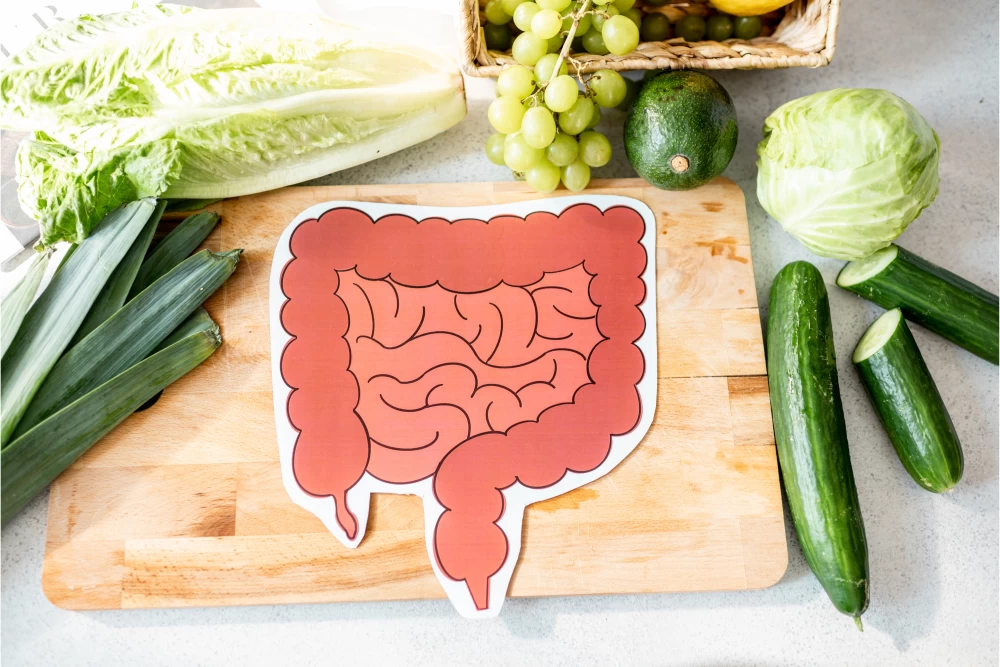
- 23rd March 2023
Table of Contents
What is a Fatty Liver?
A fatty liver, also known as hepatic steatosis, is a condition where there is an accumulation of fat in the liver cells. This buildup can lead to inflammation and damage to the liver tissue. Fatty liver disease can be caused by various factors such as obesity, alcohol consumption, high cholesterol levels or insulin resistance. It is essential to diagnose this condition early on as it can progress into more severe forms of liver disease such as cirrhosis. Incorporating fermented foods into your diet may support healthy digestion and improve overall gut health, which may help alleviate symptoms associated with fatty liver disease. Fermented foods are rich in probiotics which are beneficial bacteria that live in our digestive tract and have been shown to promote better immune function and reduce inflammation. Some examples of fermented foods include kefir, yogurt, sauerkraut and kimchi. When introducing fermented foods into your diet it's important to start slowly and monitor any reactions you may have. A nutritionist or healthcare provider can offer guidance on how much fermented food intake is suitable for you based on individual needs and health status. By incorporating these types of nutrient-dense foods into your diet along with other lifestyle modifications you could potentially support your journey towards improved liver health.
Benefits of Fermented Foods
Fermented foods have been shown to positively impact gut health, which is crucial for those with fatty liver disease. When foods are fermented, beneficial bacteria break down the sugars and starches in the food, creating lactic acid. This process produces a variety of probiotics that help to strengthen the digestive system and improve overall immunity. Incorporating fermented foods into your fatty liver diet can help reduce inflammation and promote healthy digestion. Examples of fermented foods include kimchi, sauerkraut, kefir, miso soup and kombucha. These types of food contain high amounts of beneficial enzymes that aid in digestion while providing essential nutrients such as vitamins B12 and K2. Additionally, consuming fermented foods can help improve insulin sensitivity by reducing blood sugar levels. If you are looking to incorporate fermented foods into your diet but don't know where to start, try adding them as a condiment or side dish to meals. For example, add a spoonful of sauerkraut or kimchi on top of your salad or sandwich for an added boost of flavor and nutrition. By incorporating these delicious and nutritious fermented foods into your fatty liver diet plan you will be able to enjoy all the benefits they offer while improving your overall health.
Types of Fermented Foods
Fermented foods are a great addition to any diet, especially for individuals with fatty liver disease. Fermenting foods involves the natural process of bacteria breaking down sugar and starches in food, which results in a tangy, sour taste while preserving the nutritional content. One type of fermented food is kimchi, a popular Korean dish made from fermented cabbage and spices. Kimchi contains high amounts of vitamins A and C, as well as beneficial probiotics that improve digestion and boost the immune system. Another well-known fermented food is yogurt, which is made by fermenting milk with specific strains of bacteria. Yogurt is an excellent source of calcium and protein, along with probiotics that promote gut health. Kombucha is another popular beverage made by fermenting sweetened tea with yeast and bacteria. This fizzy drink has been known to improve digestion and strengthen the immune system due to its high concentration of antioxidants and probiotics. Incorporating these types of fermented foods into your diet can help support overall health while also improving fatty liver disease symptoms.

Recipes to Try
Fermented foods are a great addition to any diet, especially for those with fatty liver disease. They contain beneficial probiotics that can help improve gut health and reduce inflammation in the body. Here are some fermented food recipes to try:
1. Kimchi: This spicy Korean side dish is made from fermented cabbage and other vegetables. It's rich in vitamins A, B, and C, as well as fiber and antioxidants. You can eat it on its own or add it to stir-fries or rice bowls.
2. Kombucha: This fizzy drink is made by fermenting tea with sugar and a SCOBY (symbiotic culture of bacteria and yeast). It's a great alternative to soda and can even help boost your immune system.
3. Sauerkraut: Like kimchi, sauerkraut is made from fermented cabbage but without the spice. It's high in vitamin C, K, and fiber, making it a great addition to any meal.
Incorporating these fermented foods into your fatty liver diet will not only aid in digestion but also provide essential nutrients for overall better health.
How to Incorporate Fermented Foods into Diet
Fermented foods have become increasingly popular in recent years due to their numerous health benefits, including improved digestion and a stronger immune system. For those with a fatty liver condition, incorporating fermented foods into their diet can also be beneficial. Foods like kimchi, kefir, and sauerkraut contain probiotics that help promote good gut bacteria which in turn helps the liver process toxins more efficiently. One way to incorporate fermented foods into your fatty liver diet is by starting small. Try adding a tablespoon of sauerkraut or pickles to your meals as a condiment. You can also try drinking kefir as a low-sugar alternative to traditional dairy products like yogurt. Another way to incorporate fermented foods is by experimenting with different recipes that include them as ingredients. For example, you can add some miso paste or tamari sauce to your stir-fry dishes for an extra umami flavor while reaping the benefits of fermented soybeans. The key takeaway when it comes to incorporating fermented foods into your diet is finding what works best for you and gradually increasing your intake over time. By doing so, you'll not only improve your digestive health but also support healthy liver function in the long term.
Tips for Consuming Fermented Foods
1. Start Small and Build Up
If you're new to fermented foods, it's essential to start small and gradually increase your intake. This will allow your gut to adjust to the new foods' beneficial bacteria. Begin with a tablespoon or two of sauerkraut, kimchi, or kefir daily and work your way up over time.
2. Diversify Your Fermented Foods
It is best to consume different types of fermented foods for maximum health benefits. Experiment with various options like kombucha, pickles, miso soup for diversity in taste and nutritional value.
3. Avoid High Sugar Fermented Foods
It's important to avoid high sugar fermented foods like sweetened yogurt as they can increase inflammation levels in people with fatty liver disease.
4. Consume Fermented Foods Regularly
Regular consumption of fermented foods is necessary for optimal gut health and liver function in people with fatty liver disease. Try incorporating them into your meals by adding them as side dishes or toppings on salads.
5. Consume Freshly Made Fermented Foods
Freshly made fermented foods have higher nutritional values than store-bought varieties that may contain additives like preservatives that can harm the liver when consumed excessively over time. By following these tips for consuming fermented foods, you'll be on the right track towards better gut health and reducing symptoms related to fatty liver disease while enjoying delicious additions to your diet!
Conclusion
In conclusion, incorporating fermented foods in your fatty liver diet can be an excellent way to boost your overall health and aid in the treatment of fatty liver disease. Fermented foods are a great source of probiotics, which help to promote gut health and reduce inflammation throughout the body. This makes them particularly beneficial for those with fatty liver disease, as reducing inflammation is a key component of managing the condition. Furthermore, fermented foods are also rich in vitamins and minerals that can support overall immune function and improve digestion. Consuming these foods regularly can not only help with weight loss but also reduce the risk of developing other chronic diseases like heart disease or diabetes. Overall, while there is no single cure for fatty liver disease, incorporating fermented foods into your diet may be a helpful step towards better health. By making small changes to your eating habits over time, you can take control of your health and make meaningful progress towards healing your body from within.














